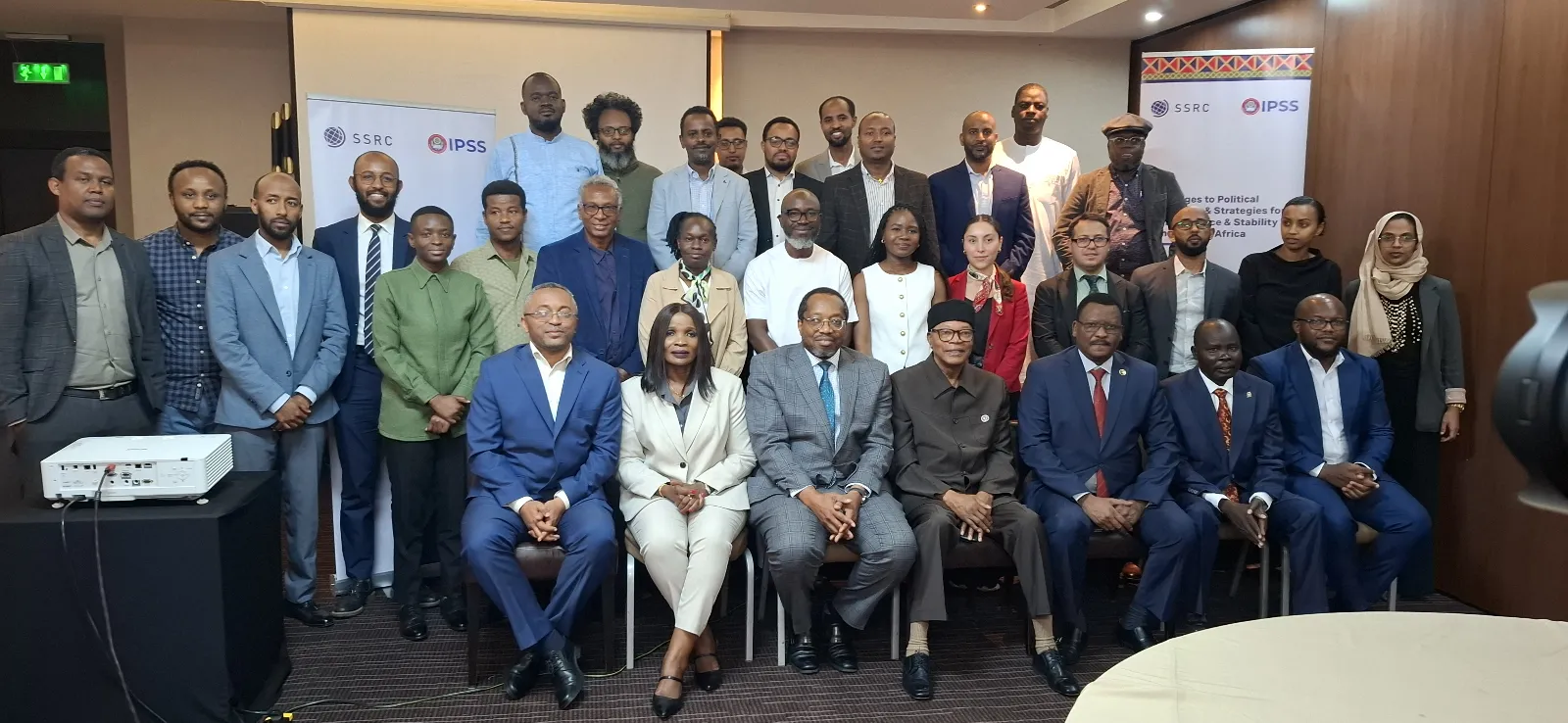The Horn of Africa remains a region of fragile political transition fraught with conflict and unpredictability. Against this backdrop, Institute for Peace and Security Studies (IPSS) and Social Science Research Council (SSRC) convened a timely and high-level policy dialogue on “Challenges to Political Transitions and Strategies for Regional Peace and Stability in the Horn of Africa,” from June 27-28, 2025, in Addis Ababa, Ethiopia. The meeting assembled senior policymakers, diplomats, scholars, practitioners, and representatives from the African Union (AU) on a multi-angle assessment of recurrent governance and security challenges in the region.
H.E. Amb. Dr. Mohamed Ibn Chambas, AU High Representative for Silencing the Guns, provided an initial examination of the region’s political context in his Keynote Address. Focusing on Sudan as a model case study, Dr. Chambas detailed how the unravelling of inclusive governance further solidified by militarization and bitter social cleavages has driven Sudan towards a brutal civil conflict. Most importantly, he argued Sudan’s upheavals are a microcosm for broader regional challenges because exclusionary politics and fragile institutions and divided civil societies block significant transitions. “We must restore hope to our people by ending the war, silencing the guns, and forging a path toward a brighter, more peaceful future.” he implored.
Over the four sessions, dialogue provided a comprehensive analysis of the origins and potential solutions for instability in the Horn of Africa. The first session looked at both of the contradictions confronting political transitions, particularly the tensions between identity groups and the state, and between state and society. Panelists and participants voiced apprehension regarding the discernible pattern wherein transitional phases, despite their democratic genesis, subsequently devolve into authoritarian regression. Debates advocated for people-centric common sense governance and local realities and identities as sources demanding political systems.
In the second session, panelists discussed new patterns of conflict in Sudan and Ethiopia and how removals of older regimes without solid institutional substitutes commonly trigger renewed cycles of violence. Armed non-state actors are emboldened by weak governance and weapons availability and exploit these transition windows. It has been noted that the ongoing presence and even escalation of horizontal and vertical inequalities, exacerbated by external intervention, create a harmful combination that undermines peacebuilding.
Session three focused attention on peacebuilding and reconciliation processes and how these had key roles for traditional leaders, community leaders, and sub-regional actors such as IGAD and the AU. The session acknowledged, however, that peace could not be attained without addressing issues at grassroots levels such as land conflict, theft of cattle, and social marginalization. It was also flagged further, how many such conflict processes had trans-boundary implications and therefore required sub-regional responses.
The final session was devoted to regional and continental effectiveness and AU’s particular initiative, Silencing the Guns. A critical discussion was generated around AU’s organizational weakness, inconsistency of political will among its member states, and external powers interfering. Panelists were also concerned about shifting coalitions, budgetary constraints, and AU’s inability to proceed without consensus among its own member states, commonly entailing putting off crucial action. Increasingly asserting a role in shaping outcomes within the Horn, other new global actors like Turkey, the UAE, and Saudi Arabia were also discussed.
Throughout our discussions over the past day and a half, there was only one certainty: that neither stable political transition nor peace will arise from pressure from outside alone nor from top-driven initiatives. Instead, solutions must be indigenous, rooted in local realities, and supported by broad-based dialogue and accountable governance. Participants advocated for stronger connections between grassroots activism, particularly by civil society organizations and women’s and youth networks, and regional processes.
When the conversation drew to a close, there was no mistaking that this was no abstract exercise but a call to action. During the closing remarks participants were reminded of a strong truth: peace is not only negotiated around the conference table—it is built through everyday practice around inclusive governance, collective power, and regional solidarity.
For more updates, articles, and upcoming events from IPSS, follow https://ipss-addis.org .

